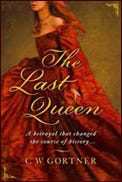Juana of Spain, the subject of The Last Queen, deserves to be better known. She was the daughter of King Ferdinand and Queen Isabella. Her youngest sister was Catherine of Aragon, first wife of King Henry VIII of England. Both of her sons became Holy Roman Emperors, first Charles V from 1519 to 1556, then Ferdinand I from 1556 to 1564. After her mother's death, she had a serious claim to the throne of Spain, thus the novel's title.
Juana's life was filled with drama. At 16, she was betrothed to an 18-year-old Habsburg prince, Philip the Fair of Flanders. They had never set eyes on each other. When at last they did, they demanded to be married on the spot and retired to their bedroom. Despite this early evidence of success, the marriage was tempestuous. Philip saw no reason to curb his appetite for women, and Juana reacted with furious jealousy. After Queen Isabella died naming Juana heir to the Spanish throne, Philip tried to have her declared incompetent to rule. She is known to history as Juana la Loca: Juana the Mad. Some historians question, however, whether she was truly mad or if this was a slander spread by the power-hungry men in her life.
It would be easy to portray Juana as a helpless victim of circumstance. Gortner, to his credit, does not. In The Last Queen, she is an intelligent and determined woman, passionate but sane, struggling to protect her beloved Spain from becoming a tool of Habsburg policy. The novel is as passionate as Juana, a breathless page-turner that's hard to put down. An occasional California-ism ("I flashed on…") can be jarring; otherwise, the prose immerses the reader in Juana's world: Spain, sultry and austere at once; Flanders, a rich commercial center, water-soaked and lusty. (2008, 368 pages, including an afterword separating history from fiction)




